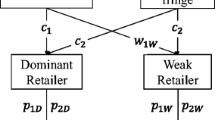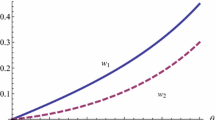Abstract
We investigate the collusive incentive for far-sighted manufacturers selling via managerial retailers. In contrast to the existing literature, we find that revenue delegation can impede upstream collusion in Bertrand models. This happens due to market exit in the deviation phase when products are close substitutes. The result of managerial delegation hindering upstream collusion is robust if we allow manufacturers to consider partial collusion. Furthermore, we show that less intensified downstream competition does not always harm consumers. If upstream collusion is less sustainable with managerial retailers, consumers can be better-off.



Similar content being viewed by others
Notes
The assumption of exclusive dealing precludes the downstream firm buying from a different upstream firm and therefore softens competition in the upstream market. It is restrictive but quite standard in the literature on vertically related markets. Besides exclusive retailing, this model also applies to markets where downstream firms produce differentiated products and upstream firms independently supply inputs to each of them. For example, pharmaceutical companies producing biosimilar drugs require distinct inputs for different chemical reactions.
The asymmetry of wholesale prices can arise as an equilibrium result in our paper. With a different focus, Mendi (2009) studies downstream collusion with exogenous cost asymmetry. In that paper, the role of one cartel member is enriched after backward integration by allowing for selling input to the other member.
We study tacit collusion among manufacturers in a setting where the wholesale demand is endogenously determined by the Nash equilibrium of a downstream Bertrand game. Plenty of studies show how the collusion stability can be affected by other parties’ strategic behaviors, but from different angles. For instance, Correia-da Silva and Pinho (2018) studies collusion among private firms who compete with public firms in a mixed oligopoly.
We refer to Kopel and Pezzino (2018) for a survey.
References
Albæk S, Lambertini L (1998) Collusion in differentiated duopolies revisited. Econ Lett 59(3):305–308
Albæk S, Lambertini L (2004) Price vs quantity in duopoly supergames with close substitutes. Ann Reg Sci 38(4):567–577
Bian J, Lai KK, Hua Z (2013) Upstream collusion and downstream managerial incentives. Econ Lett 118(1):97–100
Bloomfield MJ (2018) Compensation disclosures and the weaponization of executive pay: Evidence from revenue-based performance evaluation. SSRN. https://ssrn.com/abstract=2862069. Accessed 25 Mar 2020
Catalão-Lopes M, Brito D (2020) Post-merger internal organization in multitier decentralized supply chains. J Econ 132(3):251–289
Choi K (2019) Price and quantity competition with asymmetric costs in a mixed duopoly: a technical note. Bull Econ Res 71(1):33–46
Correia-da Silva J, Pinho J (2018) Collusion in mixed oligopolies and the coordinated effects of privatization. J Econ 124(1):19–55
Deneckere R (1983) Duopoly supergames with product differentiation. Econ Lett 11(1):37–42
Fershtman C (1985) Managerial incentives as a strategic variable in duopolistic environment. Int J Ind Organ 3(2):245–253
Fershtman C, Judd KL (1987) Equilibrium incentives in oligopoly. Am Econ Rev 77(5):927–940
Gu D, Yao Z, Zhou W, Bai R (2019) When is upstream collusion profitable? Rand J Econ 50(2):326–341
Katz ML (1991) Game-playing agents: unobservable contracts as precommitments. Rand J Econ 22(3):307–328
Kopel M, Pezzino M (2018) Strategic delegation in oligopoly. In: Corchón LC, Marini MA (eds) Handbook of game theory and industrial organization, volume ii. Edward Elgar Publishing. https://doi.org/10.4337/9781788112789.00018
Lambertini L (2017) An economic theory of managerial firms: strategic delegation in oligopoly. Taylor & Francis, Milton Park
Lambertini L, Trombetta M (2002) Delegation and firms’ ability to collude. J Econ Behav Organ 47(4):359–373
Ledvina A, Sircar R (2011a) Bertrand and Cournot competition under asymmetric costs: number of active firms in equilibrium. SSRN. https://ssrn.com/abstract=1692957. Accessed 25 Mar 2020
Ledvina A, Sircar R (2011b) Dynamic bertrand oligopoly. Appl Math Optim 63(1):11–44
Matsumura T, Matsushima N (2012) Competitiveness and stability of collusive behavior. Bull Econ Res 64:s22–s31
Mendi P (2009) Backward integration and collusion in a duopoly model with asymmetric costs. J Econ 96(2):95–112
Milliou C, Pavlou A (2013) Upstream mergers, downstream competition, and R&D investments. J Econ Manag Strategy 22(4):787–809
Milliou C, Petrakis E (2007) Upstream horizontal mergers, vertical contracts, and bargaining. Int J Ind Organ 25(5):963–987
Nocke V, White L (2007) Do vertical mergers facilitate upstream collusion? Am Econ Rev 97(4):1321–1339
Nourayi MM, Daroca FP (2008) CEO compensation, firm performance and operational characteristics. Managerial Finance
Piccolo S, Reisinger M (2011) Exclusive territories and manufacturers’ collusion. Manag Sci 57(7):1250–1266
Reisinger M, Thomes TP (2017) Manufacturer collusion: strategic implications of the channel structure. J Econ Manag Strategy 26(4):923–954
Ross TW (1992) Cartel stability and product differentiation. Int J Ind Organ 10(1):1–13
Schelling TC (1960) The strategy of conflict. Harvard University Press, Cambridge
Singh N, Vives X (1984) Price and quantity competition in a differentiated duopoly. Rand J Econ 15(4):546–554
Sklivas SD (1987) The strategic choice of managerial incentives. Rand J Econ 18(3):452–458
Vickers J (1985) Delegation and the theory of the firm. Econ J 95:138–147
Wang LFS (2014) Extended games played by managerial firms with asymmetric costs. Game Theory 2014:1–10. https://doi.org/10.1155/2014/631097
Zanchettin P (2006) Differentiated duopoly with asymmetric costs. J Econ Manag Strategy 15(4):999–1015
Acknowledgements
We are indebted to the Editor and anonymous reviewers for valuable suggestions. The early version of this paper was written when Han was at Wenlan School of Business. We thank participants at the Japanese Economic Association 2017 Spring Meeting for helpful advice and comments. Any remaining errors are our own.
Author information
Authors and Affiliations
Corresponding author
Additional information
Publisher's Note
Springer Nature remains neutral with regard to jurisdictional claims in published maps and institutional affiliations.
Rights and permissions
About this article
Cite this article
Wang, L.F.S., Wang, H. Will managerial delegation impede upstream collusion?. J Econ 134, 127–146 (2021). https://doi.org/10.1007/s00712-021-00741-z
Received:
Accepted:
Published:
Issue Date:
DOI: https://doi.org/10.1007/s00712-021-00741-z




